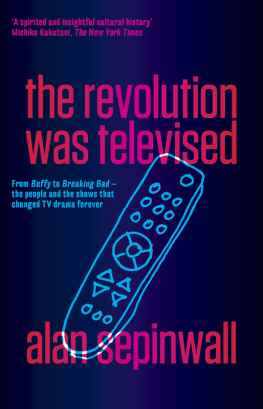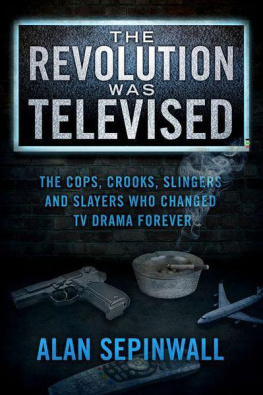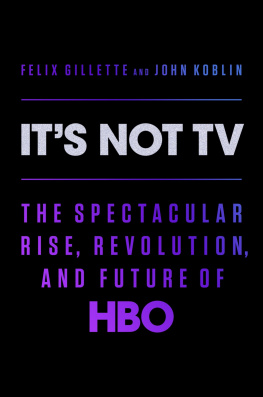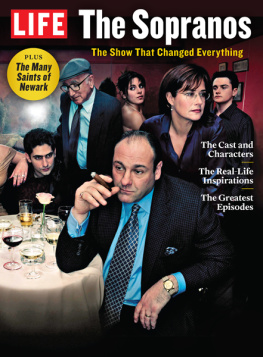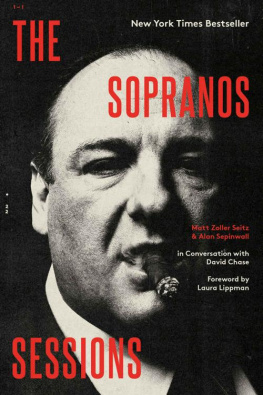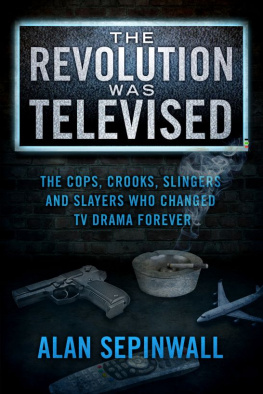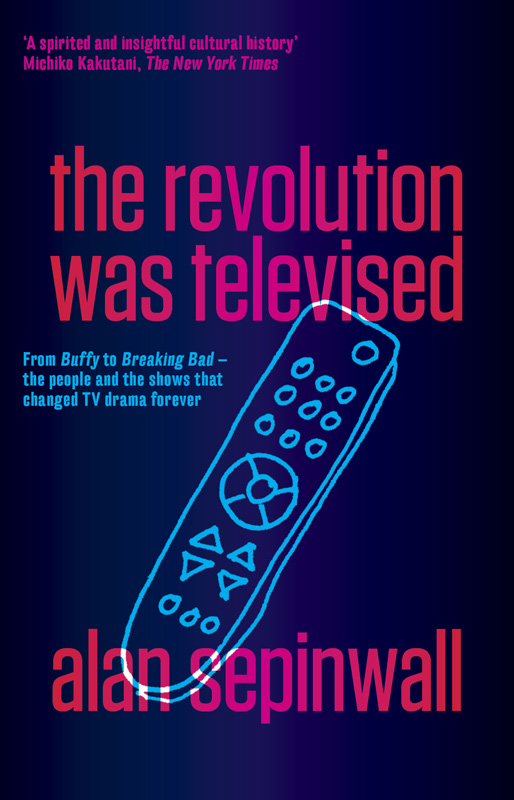A spirited and insightful cultural history A terrific book.
Mr. Sepinwall is an astute critic but also a dogged reporter. Part critical appraisals, part history lessons it adds up to something like an oral history of Mr. Sepinwalls small-screen revolution.
A smart and substantive walk through the past fifteen years of television drama, making a lucid case for the auteurist mentality among modern showrunners.
TV fans have a new must-read.
[A] thoroughly detailed and immensely entertaining stroll through the new Renaissance of American television Addictive.
Sepinwall is a sharp and prolific critic In Revolution , though, he admirably often stands back and lets his subjects words speak for themselves with insights that will make you see anew just how a Friday Night Lights or Buffy season truly worked, while tossing off the kind of dead-on descriptions that make his blog a blast to read.
The best book by a journalist on American television that Ive read in at least 20 years in all its ultrasmart hyperbole and eye- and brain-opening glory.
While it is bracingly readable and full of Alans passion about these shows, it is also a valuable reference work Solidly reported.
I cant recommend this engaging history highly enough.
A must-read for anyone who has ever fallen hard for a TV show.
Copyright
Published by Black Inc.
an imprint of Schwartz Media Pty Ltd
3739 Langridge Street
Collingwood Vic 3066 Australia
email: enquiries@blackincbooks.com
http://www.blackincbooks.com
Copyright 2013 by Alan Sepinwall
ALL RIGHTS RESERVED.
No part of this publication may be reproduced, stored in a retrieval system, or transmitted in any form by any means electronic, mechanical, photocopying, recording or otherwise without the prior consent of the publishers.
First published in the United States as The Revolution Was Televised: The Cops, Crooks, Slingers, and Slayers Who Changed TV Drama Forever by Touchstone, a division of Simon & Schuster, Inc.
National Library of Australia Cataloguing-in-Publication entry:
Sepinwall, Alan, author.
The revolution was televised : from Buffy to Breaking Bad : the people
and the shows that changed TV drama forever / Alan Sepinwall.
ISBN for eBook edition: 9781922231031
ISBN for paperback edition: 9781863956109 (paperback)
Television programs.
791.457
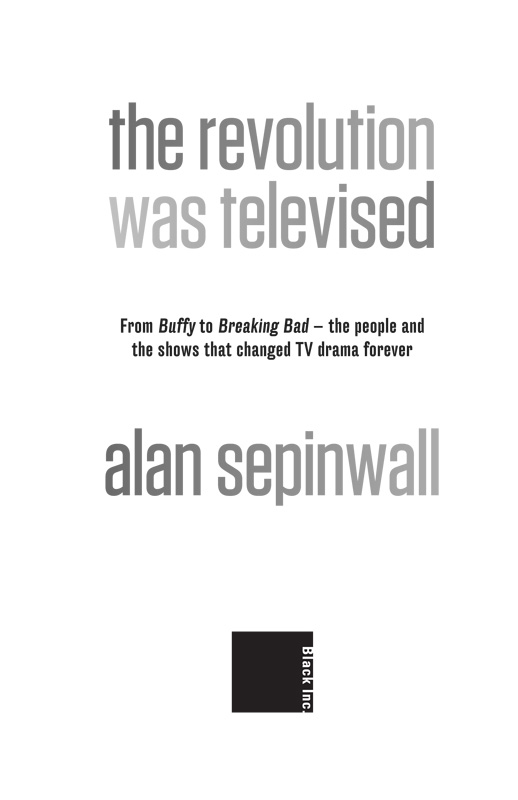
Contents
This book is dedicated to two people I dearly wish
were still here to read it:
Dr. Jerry Sepinwall, who always encouraged
my love of reading and writing,
David Mills, who gave me my first peek
behind the curtain
INTRODUCTION
And they pay you for this?
Once upon a time, any conversation I had with a stranger about my job as a television critic led to that question. Some were amused that this was the way I made my living. Others were disdainful, insisting that they didnt watch much television (or even own a TV). More often than not, the conversation would hit a dead end when I said that I didnt also write about movies.
But if my job didnt make sense to these strangers, it made perfect sense to me. I had stumbled onto the best gig in the world. I was being paid to watch television. I was, of course, also being paid to write about television, which not everyone could do, and there were times where it wasnt so much that I got to watch television for a living, but that I had to watch it (where have you gone, Homeboys From Outer Space ?), but overall, it was a dream come true.
It was a dream I had fallen into by continually being in the right place at the right time for someone with my interests. I matriculated at the University of Pennsylvania with the first class of non-engineers to receive an email address and a Unix shell account, and I began using both to write obsessively about NYPD Blue , first on Usenet, then on a website I set up on the campus server (where it still sits, a monument to cutting-edge web design circa 1994). Online reviews of anything were still a novelty when I graduated in 96, and that website helped me land a features internship at The Star-Ledger of northern New Jerseymy hometown newspaperin a summer when the papers longtime TV critic couldnt make it to the TV critics press tour in LA. My editors gambled on sending me in his place, I didnt embarrass myself, and they offered me a full-time job as the back-up TV writer. In college, Id been told I would be extraordinarily fortunate to land a full-time job as an entertainment critic at a small paper within five years; Id lucked into one at a big paper within five weeks.
Even better, it seemed like the best time in entertainment history to be a television critic. From where I sat, TV was in the middle of another golden age, filled with smart comedies and, more importantly, dramas like NYPD Blue and Homicide that I felt tapped into what I had seen for years as the limitless potential of TV storytelling. I loved movies, but Id also seen in shows like Hill Street Blues and St. Elsewhere that the small screen had certain advantages over its bigger, more prestigious cousin. It could tell very long stories. It could allow characters to grow over extended periods of time. And by coming into my home rather than making me go to it, it could forge a more intimate bond with me. As I grew up, very few shows were willing or able to exploit those advantages to the fullest, but by the time I arrived at The Star-Ledger , more and more were figuring it out.
I was, I said to myself often, privileged to be covering a medium that had become as good as I had always dreamed it would bethat was, possibly, as good as it could ever possibly be.
I was wrong.
I thought I had seen the TV universe at its most vast and impressive. Instead, I was about to witness a big bang of sorts, one that would greatly expand the boundaries of this universe, and the way we viewed it.
I was about to see The Sopranos .
I was about to see Oz . The Wire . Deadwood . The Shield . Lost . Buffy the Vampire Slayer . 24. Battlestar Galactica. Friday Night Lights . Mad Men . Breaking Bad .
I was about to see television achieve its full potential, and step out from the shadow of the cinema.
I was about to see a revolution.
And the revolution began not just with the talented creators of these showstelevision had, after all, been no stranger to creative geniuses, going back to Rod Serling and Paddy Chayefskybut with dynamic shifts in the television business itself, and in the many ways people watched TV.
When I started at the Ledger in the summer of 1996, you had the broadcast networks, and then you had everyone else. (And within the network universe, Fox had only begun to be treated as anything but a novelty; the WB and UPN were runts fighting over table scraps.) HBO had a few original comedy series and its movies, but if you wanted scripted television, you mostly went to ABC, CBS, NBC, and occasionally Fox.

